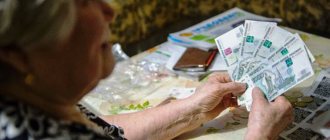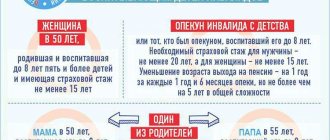- home
- Reference
- Disability pension
The state provides support for socially vulnerable citizens in various ways: by providing pensions and preferential conditions.
Minors with disabilities have the right to receive financial assistance from the state at the federal and regional levels . The most common option for financial assistance for this category of people is a social pension.
Who are disabled children?
The category of disabled children includes persons who have serious physical or mental health problems. The fact of disability is determined by the medical institution at the place of residence and the competent commission. To obtain this status, a combination of the following conditions is necessary:
- The presence of a congenital or acquired defect that interferes with the normal functioning of the body.
- Lack of ability to perform certain functions. Such as orientation in space and time, self-control of behavior, learning, movement, self-care.
- The need for rehabilitation measures, preventive treatment to prevent the condition from worsening, to improve it or maintain it at a certain level.
Only after three signs are present and the necessary documentation is filled out, parents or guardians can apply for a pension for disabled children. To obtain a disability, you must come to the MSEC (medical and social examination) with the following documents:
- referrals from a medical institution that is treating a small patient. Moreover, it does not matter whether it is public or private;
- passed medical examination;
- outpatient card;
- birth certificates.
If an adult does not have the opportunity to personally attend the MSEC, then the examination can be carried out at home or in a hospital ward. It is also possible to make a decision in absentia from expert examination specialists, based on the documentation issued by the medical institution. Additional testing may be necessary. In this case, it is possible to suspend the MSEC and assign it to another time.
Please note that the assignment of a disability group is not made until the age of 18. It turns out that group 1, group 2, group 3 are assigned only after reaching adulthood. Until this time, the child has the status of a disabled child.
The category “disabled child” is confirmed once every two years. There is also the right to be assigned disability until adulthood. After turning 18, you must undergo re-examination. If he further refers to the disabled population, then the disability is reassigned, with the assignment of the status “disabled from childhood”.
What is Social Security Disability Pension and who receives it?
The decision on whether a person is disabled in the Russian Federation is made by the Bureau of Medical and Social Expertise (BMSE). To approve a citizen as a disabled person, he must meet the following parameters:
- Incapacity of organs or systems of the body due to illnesses or, as a result, injuries.
- Inability to function independently (speech reproduction, movement, learning, etc.)
- The need to receive social security.
All pension payments are divided into insurance and social. Insurance benefits are paid from insurance premiums, while social benefits are paid from the state budget, have a fixed amount and are guaranteed by the state. A disabled child can only receive the second type of payments, because he has no work experience. For him, this pension payment is financial assistance, and not compensation for lost income due to loss of ability to work.
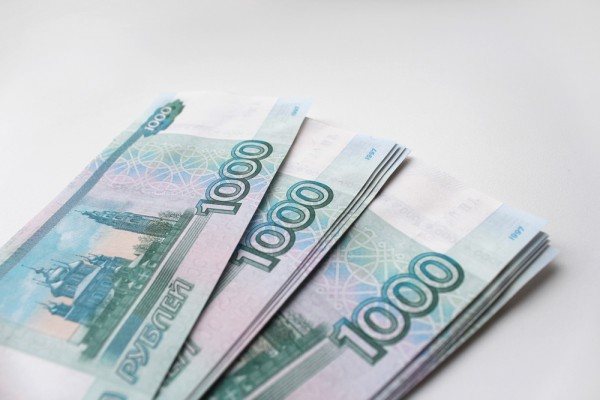
Any resident of Russia has the opportunity to receive social benefits (this also applies to those persons who have lived in the Russian Federation for a long time, but do not have citizenship). In this case, disability benefits are assigned:
- disabled children.
- citizens with I, II or III disability groups (including disability since childhood).
Important! A disability group is assigned only when the child reaches the age of majority (from 18 years of age). Prior to this, children belonging to this category of citizens have the status of “disabled child”. The examination establishes the presence of disability for a certain period. Attribution to one or another group is determined by the BMSE during the medical commission. At the same time, different disability groups have different levels of social benefits, so your social pension may decrease.
Return to content
Types of pension
Today there are the following types of preferential pensions:
- Social is assigned after recognition of the fact of disability until the end of this period or until the age of majority.
- For the loss of a breadwinner. This type is accrued if the deceased had official employment. Payments are made from the moment the fact of disability is established until the end of its term.
- Additional payments and benefits for families with children with disabilities. The state has provided a number of social benefits and one-time payments as support.
Parents of disabled children have the right to an additional four days off during the month, a part-time work week, and additional leave paid by the employer. Children with systematic health problems, permanent residents of Russia, non-working parents, and guardians can receive the listed compensations and benefits due to the need for constant care for a disabled child.
In addition, if the child was disabled, then the parents have the right to early retirement.
Additional payments for families with disabled children
The state pays all families with a sick child with a disability a cash benefit. Now it is 2701 rubles. This includes NSO, which can be received in money or services.
Its value is 1121 rubles. If the parents decide to receive his services, the amount is deducted from the amount of the EDV. What is included in the NSO:
- necessary medications;
- dietary nutrition;
- voucher to a sanatorium;
- travel to the place of treatment.
The amount of various benefits for disabled children increases every year. In addition to the pension, the state pays them EDV. And parents or guardians have the right to care allowance and social benefits.
How to make payments
To apply for a social pension, you must pass the MSEC and provide the necessary package of documents to the Pension Fund of the Russian Federation. After this, you can expect to receive cash payments. To apply for a social pension you must provide:
What is due to a disabled child?
- an application indicating a request for the accrual of benefits;
- birth certificates;
- extracts from the medical report;
- passports of parents or other legal representatives of the child;
- a certificate confirming the fact of disability, its group indicating the reason that led to the systematic deterioration of health;
- a document confirming the fact of residence in Russia.
The disability pension is calculated from the beginning of the month in which the documents were collected and transferred to the institution. Registration can take place at the MFC. There is no specific time frame for this process. The documentation is reviewed for 10 days, then payment is made. It is possible to receive a refusal if the documentation is incompletely collected.
If a child does not have permanent registration in the region, then the Pension Fund does not have the right to refuse to accrue cash benefits to him. In this case, it is possible to provide documentation that confirms the fact of residence in the Russian Federation.
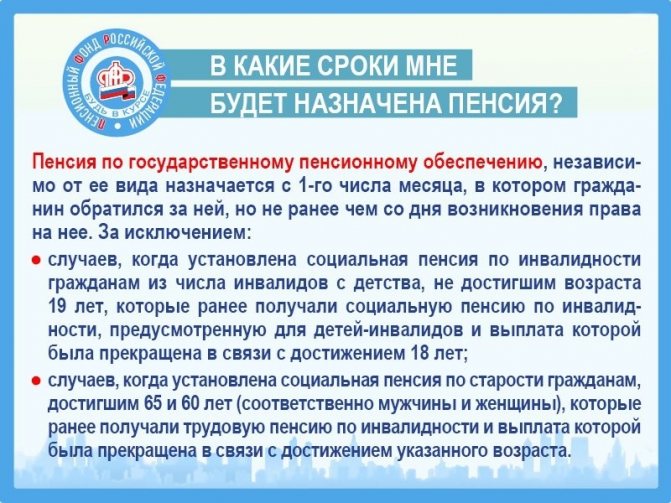
Also, childhood disability implies the accrual of monthly payments. To complete them, you need to collect the following documents:
- a statement indicating the refusal to receive “natural” services;
- passport of the legal representative;
- an extract from the medical examination report;
- a document confirming relationship or evidence of adoption, guardianship;
- pension certificate.
This package must be submitted by October 1st. When making monthly payments, the child is denied social services.
Assigning pensions to children
After passing a medical examination and establishing the right to disability, the parents of a sick child apply to the Pension Fund for a pension. The application can be submitted directly to the Pension Fund or through any Multifunctional Center. It can also be sent by mail or online. At the same time, you need to know the specifics of assigning a pension to a disabled child in 2020:
- given for several years, and in case of severe illnesses until adulthood;
- the amount of payments is constant and increases annually depending on inflation;
- These are federal payments, and in some regions there are also regional benefits;
- one of the parents receives child care benefits, as well as the right to early retirement.
Required documents
To apply for a pension, you need to write an application and collect documents. This is done by the child's parent or guardian. If they are absent, any legal representative can submit them. What you will need:
- statement;
- ITU conclusion;
- birth certificate;
- certificates confirming permanent residence in Russia;
- insurance certificate;
- passport and insurance certificate of the parent, and for guardians, also documents from the guardianship authorities certifying their right to represent the child.

Appointment procedure
There are no specific deadlines for when to apply for social benefits. The application can be submitted at any time after passing the ITU.
Payments will be made from the 1st day of the month when the parents applied to the Pension Fund. Usually the application is considered no more than 10 days. After this, either a decision is made on payment, or parents are informed of the refusal due to incorrectly completed documents. They must be provided 3 months in advance.
If the disability was granted for a certain period, after re-examination there is no need to submit an application again, only a certificate from the ITU.
Automatic assignment
In the near future, it will be even easier for disabled children to receive a pension. When electronic document management is introduced everywhere, ITU will automatically send information about them and the payments they are entitled to to the Pension Fund.
As it turns out
The benefit is paid monthly, usually before the 15th. You can choose any method to receive it. There are several options:
- Russian Post, possibly with home delivery;
- in Sberbank with transfer to a card or account;
- through another bank.
After the passport is issued, if the disabled person is legally capable, he can receive his money independently.
Pension amount
For children who are pensioners due to illness, the social pension in 2019 is 12,082 rubles. Indexation will take place annually in April. This increase is aimed at covering the inflation of the past year. At the same time, the cash benefit will be increased by 4.1%. Many people are interested in how much the increase will be. On average, pensions for disabled children are increased by 200 rubles per month.
The categories “disabled children” have three disability groups that affect the amount of cash payments:
- Group 1 receives 12,082 rubles;
- Group 2 – 10,068 rubles each;
- Group 3 – 4279 rubles each.
Upon loss of a breadwinner, a child receives 5,034 rubles. monthly. If he lost both parents, then he will receive additional payments of up to 10,068 rubles. The child does not simultaneously receive payments related to the loss of a breadwinner and a social pension. It is necessary to make a choice in favor of one cash benefit.
What types of payments and benefits are they applying for?
Russia is officially considered a social state, so all disabled people receive certain payments and benefits (however, whether it is possible to live on this without having other income is a more than controversial issue). Disabled children are no exception, who receive the right to a number of preferences from the state due to their status:
- disability pension;
- monthly cash payment and a set of social services;
- payments for parents to care for a disabled child;
- benefits for housing and communal services;
- transport benefits;
- tax benefits, etc.
As for pensions, everything is simple - since a disabled child most likely cannot have insurance coverage, he applies for a social disability pension
. It is established by law and increases every year by an indexation percentage (and is approximately 2.4 times the standard social pension - approximately 13.5 thousand rubles per month). After reaching the age of 18, the pension will be assigned based on the disability group.
Monthly cash payment
for a disabled child is also set at a fixed amount and is paid along with the pension.
In 2020 it is a little more than 1.6 thousand rubles. The EDV includes a set of social services
(free medicines, sanatorium-resort treatment and travel to it), they can also be received in monetary terms (then about 1.1 thousand rubles are added to the EDV).
And also the right to additional payment
parents of a disabled child have - recently it was 5.5 thousand rubles, but since the middle of last year the payment was raised to 10 thousand rubles (though only if the parent who is caring for a disabled child does not work).
In total, in 2020, a disabled child is entitled to the following amount per month:
- pension – 13,454.64 rubles;
- EDV – 1,627.61 rubles;
- NSO compensation – 1,155.06 rubles;
- additional payment to parents - 10,000 rubles.
In total, a family can receive up to 26,237.31 rubles per month for a disabled child. And if the family lives in one of the remote areas, payments will be increased by the regional coefficient. If you wish, you can save free medicines or sanatorium-resort treatment - if, for example, more than 900 rubles are spent on medicines per month (if the NSU is kept in kind, the cost of services is not limited.
In addition, families with disabled children also apply for other benefits from the state:
- provision of housing - if a family needs improved housing conditions, it will be placed in a separate queue (which, in theory, moves faster than the general queue);
- compensation for expenses for housing and communal services - such families will be refunded 50% of the paid utility bills upon application. Moreover, unlike many other beneficiaries, compensation is calculated on the entire area of the apartment and on the entire consumption of utilities (and not on the standard);
- tax benefits - the standard personal income tax deduction has been increased to 12 thousand rubles; in a number of regions there are transport tax benefits;
- benefits in transport - in city and suburban transport, a disabled child and one accompanying person can travel for free. There is also free travel on trains, intercity buses and planes, but only once a year to the place of treatment and back (included in the NSU);
- labor and other benefits - parents can receive a shortened working day, and the disabled child himself can enter a university without competition.
What can you spend your payments on?
Pension transfers for disabled children can be sent to a bank account, bank card, or received by mail. Usually there is no need to report where the money was spent. However, it is expected that they will be aimed at the following purposes:
- Food;
- clothes;
- medicines;
- tuition fees;
- socialization of children.
If a disabled child is taken under guardianship, the guardian must annually provide a report on the money spent. Receipts and checks are proof of spending.
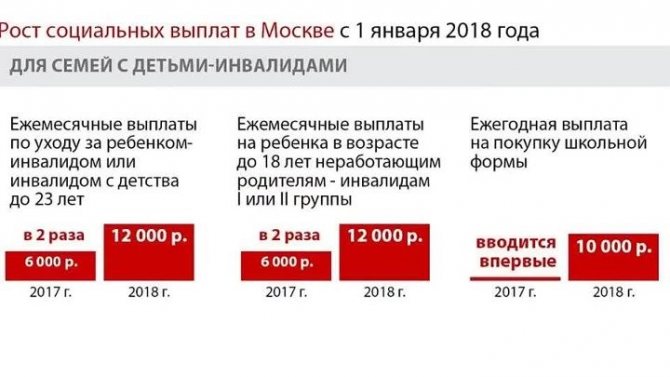
Alimony from a pension for a disabled child
The disability benefit obviously belongs to the child; it cannot be used to pay off alimony arrears, since they are calculated from the parent’s earnings. All funds must be used to cover the needs of the disabled person; the guardian has no right to spend them on paying loans and fines.
Note! Disabled parents pay child support from their pension. This is due to the fact that it is direct income and must be subject to liability by law. Therefore, in the event of a divorce, the guardian, if necessary, loses part of the state payments in favor of the child.
Regional surcharges
In addition to state support measures, there are regional ones, established separately by local legislation. St. Petersburg pays a disabled child 6,223 rubles every month. In Moscow this amount is 12,000 rubles. In Samara, families with a disabled child receive an additional 1,000 rubles. These cash payments are transferred to a social card.
Moreover, the amount cannot be withdrawn in cash, but can be used to pay in stores to buy things or food for children. For your information, pensions for disabled children are issued every month until the 15th. A pension for a disabled child is a measure of state support aimed at improving the life and socialization of a small patient, allowing him to receive the necessary care from loved ones.
Who will have their pension indexed from April 1, 2020?
From April 1, 2020, pensions will be indexed:
- disabled people (groups 1, 2, 3);
- disabled children;
- children who have lost one or both parents receiving education;
- persons classified as small-numbered peoples of the North (men upon reaching 55, women upon reaching 50);
- pensioners (men over 65 and women over 60).
Depending on the group to which the beneficiary belongs, the amount of social benefits is calculated. It is raised every year on April 1st. It is regulated by pension legislation. In previous periods, indexation was felt by all beneficiaries. For example, in 2014, all categories of citizens experienced a noticeable increase.
Then payments were immediately increased by 17%. In 2020, indexation was just over 10 percent. After this, the figure began to decline. In 2020 - 4%, and in 2020 - only 1.5%. Therefore, against the background of the previous increase, the upcoming one looks a little more significant.
Increasing pensions for disabled children in 2020
The increase in social pensions for disabled children and people with disabilities since childhood is carried out annually not from January 1, but from April 1 (Article 25 of Federal Law No. 166-FZ of December 15, 2001 “On State Pension Provision in the Russian Federation”), while the recalculation amount is established by a separate resolution of the Government of the Russian Federation. The size of the social pension is directly dependent on the pensioner’s subsistence level (PLS). To calculate the indexation coefficient, it is necessary to calculate the growth rate of PMP over the past year.
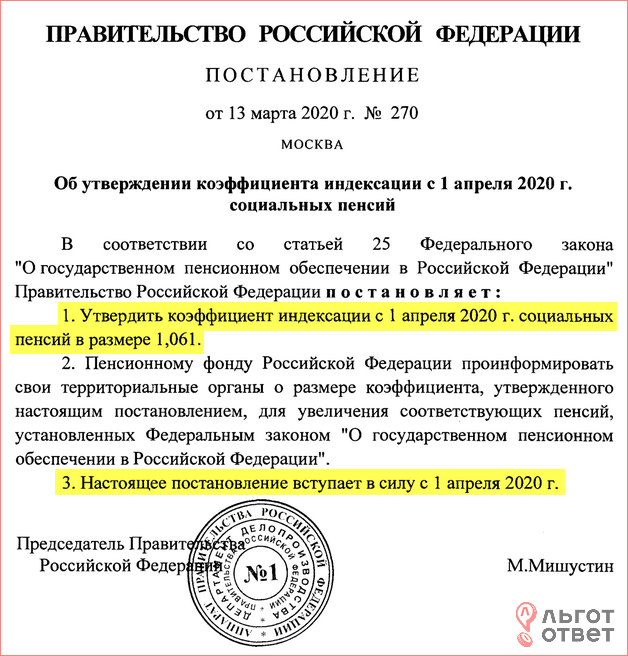
According to Decree of the Government of the Russian Federation No. 270 dated March 13, 2020, the indexation coefficient of social pensions in 2020 will be 1.061, that is, 6.1%. Thus, the pension of a disabled child will be increased by 773.55 rubles from April 1, 2020.
Table - Indexation of pensions in 2020 for disabled children
| Categories | Amount of pension for disabled children in 2020 (amount, rubles per month) | |
| from January 1, 2020 | from April 1, 2020 | |
| Disabled children | 12681,09 | 13454,64 |
| Disabled people from childhood, 1st group | ||
| Disabled people since childhood, 2 groups | 10567,73 | 11212,36 |
| Disabled people since childhood, 3 groups | 4491,30 | 4765,27 |
As can be seen from the table presented, the amount of pension for a disabled child, regardless of the degree of impairment of his health, is higher than for other categories of persons with disabilities, since children, due to their age, even with correctable health deviations, cannot independently exercise the necessary self-control (taking medications, dietary restrictions , physical activity regimen, etc.).
The size of the social pension also depends on the region: in regions of Russia with difficult climatic conditions (the Far North and similar areas) it is additionally increased by the corresponding coefficient, and in the central and southern regions it does not change.
From April 1, 2020, the size of all social pensions will change, and not just those paid in connection with disability. You can get more information about indexing in the article:

